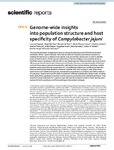2021-05-14Zeitschriftenartikel
Genome‑wide insights into population structure and host specifcity of Campylobacter jejuni
Epping, Lennard
Walther, Birgit
Piro, Rosario M.
Knüver, Marie‑Theres
Huber, Charlotte
Thürmer, Andrea
Flieger, Antje
Fruth, Angelika
Janecko, Nicol
Wieler, Lothar H.
Stingl, Kerstin
Semmler, Torsten
The zoonotic pathogen Campylobacter jejuni is among the leading causes of foodborne diseases worldwide. While C. jejuni colonises many wild animals and livestock, persistence mechanisms enabling the bacterium to adapt to host species' guts are not fully understood. In order to identify putative determinants influencing host preferences of distinct lineages, bootstrapping based on stratified random sampling combined with a k-mer-based genome-wide association was conducted on 490 genomes from diverse origins in Germany and Canada. We show a strong association of both the core and the accessory genome characteristics with distinct host animal species, indicating multiple adaptive trajectories defining the evolution of C. jejuni lifestyle preferences in different ecosystems. Here, we demonstrate that adaptation towards a specific host niche ecology is most likely a long evolutionary and multifactorial process, expressed by gene absence or presence and allele variations of core genes. Several host-specific allelic variants from different phylogenetic backgrounds, including dnaE, rpoB, ftsX or pycB play important roles for genome maintenance and metabolic pathways. Thus, variants of genes important for C. jejuni to cope with specific ecological niches or hosts may be useful markers for both surveillance and future pathogen intervention strategies.
Files in this item

